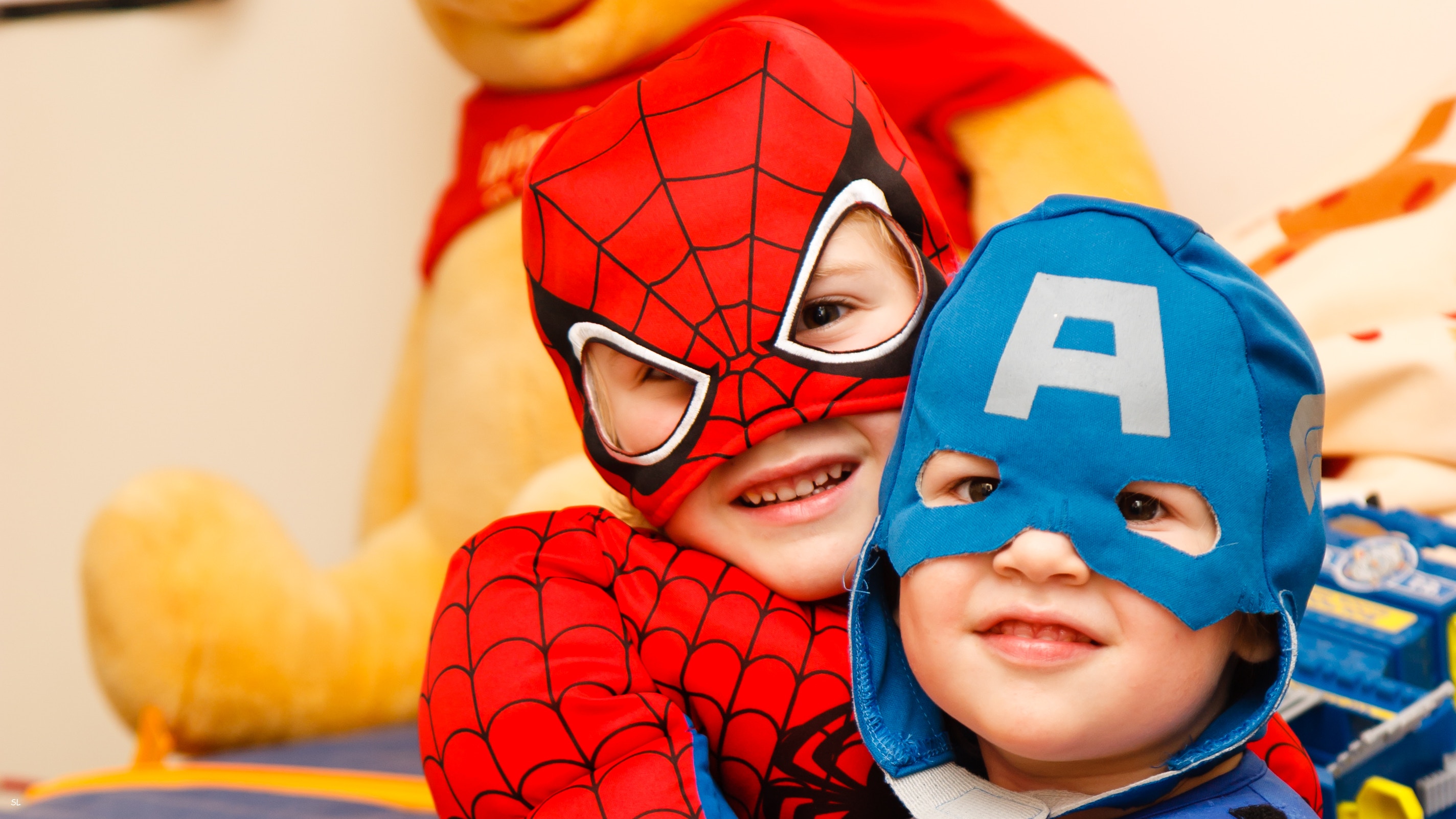Benefits Of Super Hero Play

Parents and early childhood educators know play offers many benefits for young children. Play is a way for expressing feelings, helps children to develop social, language, thinking and gross motor skills. It’s also how children process what they see in the world around them and helps them to express their feelings.
The value of play for children is undeniable, but what happens when play-based learning activities focuses on super heroes and war or violent play?
Children will engage in super hero play for two main reasons. The first is it’s what they’re seeing on television and popular media. But also because super hero play meets their developmental needs on a physical and psychological level.
There is a tendency to think allowing children to engage in this kind of play will lead to more violent behaviour in the future. Parents can be concerned if they see another child engaging in superhero play and how it might impact their own child in the early learning environment.
Are there benefits to allowing children to engage in this sort of play?
Creative, Imaginative Play
Pretend play brings a child’s imagination into the forefront, whether it’s pretending a mud pie is a delicious cake or fighting bad guys as Superman.
Imaginative play is a cornerstone of how children learn and children build their play around characters and stories they know. It’s interactive and doesn’t involve screens, allowing children to invent and improvise as their story and character develop.
Super hero play provides children with the opportunity to go outside their own or external limitations. When a child dons their super hero’s outfit or persona, they feel they have all the power and abilities of that hero.
Problem Solving
Super hero play gets children thinking about where to hide or make a defendable fort. Pretending to be super heroes helps them to look at all their options to find the best possible solution to a problem.
When children are problem solving in play, it helps them to learn how to find solutions to problems as they grow. They also learn about how to make good choices. If the play has an emphasis on killing or harming people, educators can offer alternatives such as going on adventures or rescuing people in need. It provides the opportunity to talk about how heroes are helpers.

Empowerment
Children who like to play super heroes often are attracted to feeling powerful and in control of their world, which they might not experience in other ways. This can develop their self confidence, especially in quieter kids. Being a brave super hero also helps children to imagine themselves in experiences they might be frightened of and how they can overcome their fears. It empowers children to feel more comfortable with trying out new activities or experiences.
Empathy
When children pretend to be another person, they learn to imagine how others feel. They become aware of the needs of others and think about their perspectives. These are important skills to build empathy.
Super hero play also encourages children to understand the different qualities that make people ‘good’. Attributes such as kindness, helpfulness, courage, and determination make heroes what they are, not just how strong and tough they are.
Pretend play with themes of good versus bad or friends and enemies helps children to learn these concepts and moral values. This provides many opportunities for teaching moments such as understanding another’s perspective, negotiating rules and so on.
Consent And Safety
Super hero play provides a healthy way to understand rules of consent and safety are important for all games. Often children move into very exuberant play, which involves tumbling down, pretend hitting, loud yelling etc.
These forms of play are action based rather than aggressive, but if children are becoming frightened or feel threatened, educators can step in and direct the child to be aware of how their behaviour is impacting others. If they continue to be too rough then the game ends.
Super hero play allows children to understand not only the limits to appropriate play but also their own limits. For example, a child might be comfortable with running fast but not throwing themselves down on the ground.
Educators can use teaching moments to show the difference between super heroes and real heroes. People who are real life heroes don’t fly or lift heavy objects in one hand and children should never try to replicate a super hero’s feats.
Emotional Health
Children are constantly learning but it’s being able to apply these skills in play which helps them to practice over and over. Super hero play engages their drama skills, expands their vocabulary and language development.
But just as importantly, pretending to be a super hero is way for children to develop healthy emotions. After all, super heroes face really big emotions and big challenges every single day, just like children do.
This builds children’s understanding of what emotion is, leading to them learning to regulate their feelings. Pretend play gives children space to experience a whole range of emotions, real or otherwise. Educators can create learning moments to talk through the different emotions we experience, both positive and negative. Identifying and recognising their own emotions allows children to develop healthy responses as they grow.

Cooperation
Being part of a group and building friendships is a big part of childhood, especially in the early years. Pretend play provides a means of playing out shared interests and creates the opportunities for negotiation and cooperation.
As children play, they’re inventing story lines, creating obstacles and solutions. They’re learning about teamwork and conflict resolution as they create their story, discuss the rules and how to solve problems that arise. Super hero play has the potential to teach children to how to get along in the real world.
Sam McCulloch is a freelance content writer and editor, with a special interest in parenting, birth and early education. Sam believes in the importance of building a village so no parent is left behind or feels unsupported. When she’s not writing great content, you can find her trying to keep up with three kids, enjoying the great outdoors or reading a good book.


